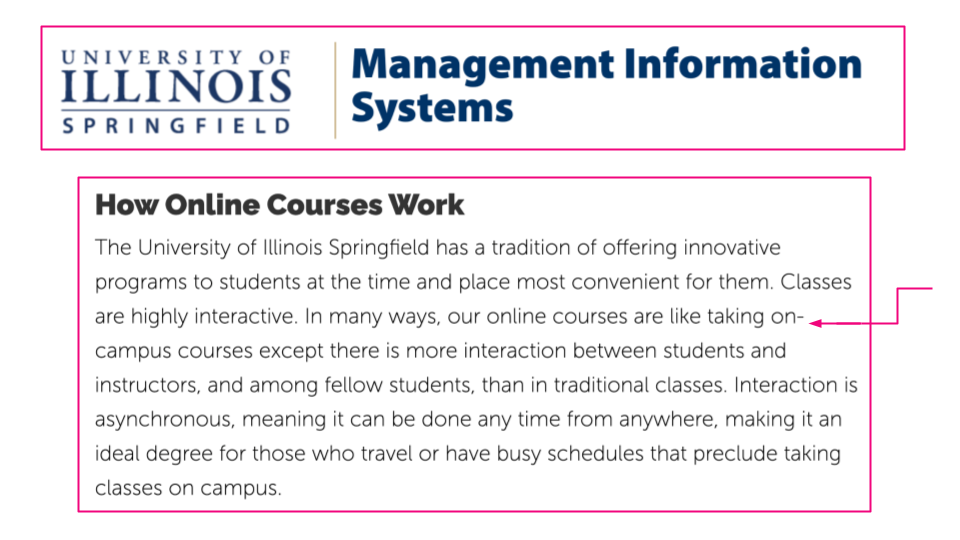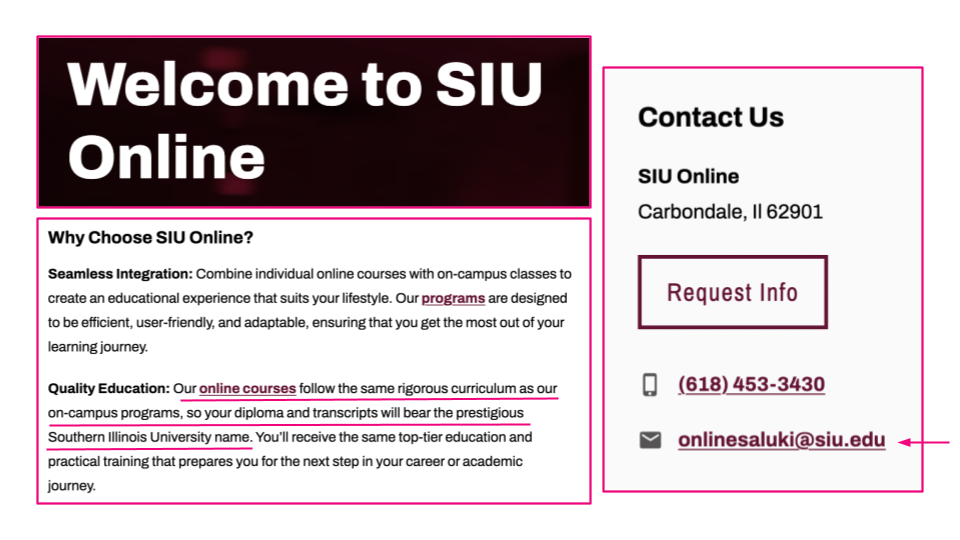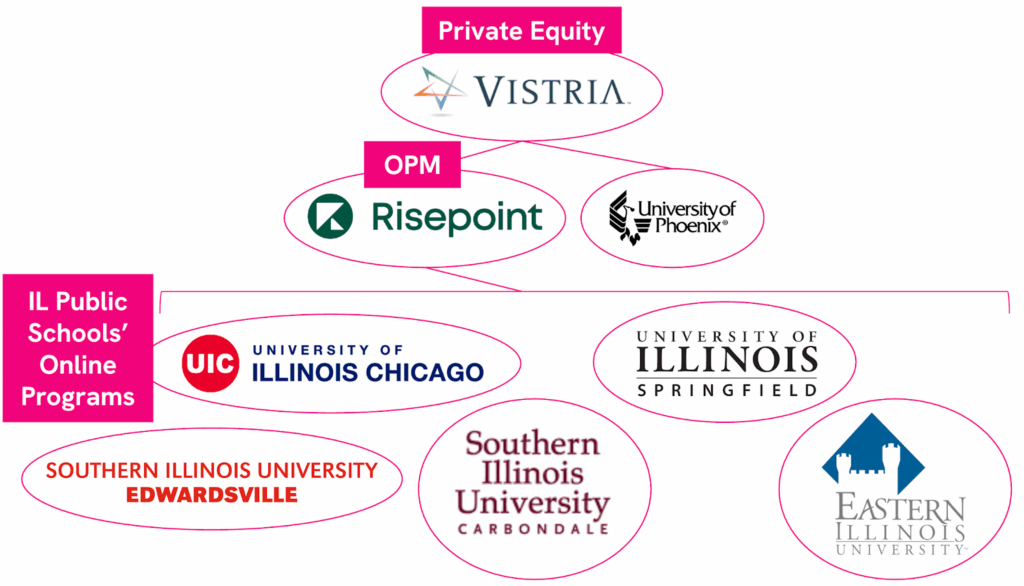By Stephanie Hall and Ella Azoulay | October 9, 2025
If you or someone you know has considered an online degree, certificate, or non-degree program from a respected Illinois public university, you likely trusted that you were dealing directly with that institution’s faculty and staff, its standards, and its support services. But what if that wasn’t the whole truth?
Last week, Protect Borrowers, University of Illinois Chicago (UIC) United Faculty, and University Professionals of Illinois Local 4100 sent a letter alerting the Illinois Attorney General and the Illinois Board of Higher Education to the findings of our recent investigation. We reviewed hundreds of pages of documents obtained by WBEZ Chicago, and found that five of the state’s public universities are partnering with a for-profit Online Program Manager (OPM) called Risepoint. Based on our review of these documents, these universities appear to be renting out their reputable brand names while outsourcing vital services to a private company—and this may be completely unbeknownst to students.
What You Need to Know About Risepoint
Risepoint, formerly known as Academic Partnerships, is currently the largest OPM in the market. It has at least 125 school partners—more than any other OPM. And it manages one-third of all OPM-run programs offered in the U.S. OPMs tend to offer schools a variety of services including marketing and advertising, recruitment, instruction, student support services like career counseling, and course design, and in exchange, receive a percentage of revenue dollars per student recruited by the OPM. These arrangements, known as tuition-sharing agreements, have been shown to lead to predatory tactics mirroring some of the worst practices by the for-profit college industry that disproportionately harms communities of color and low-income students. For example, OPMs have been found using inflated and false job placement data and high-pressure sales tactics, only to leave students burdened with a mountain of debt and without the success or skills they were promised.
“Risepoint, formerly known as Academic Partnerships, is currently the largest OPM in the market. It has at least 125 school partners—more than any other OPM. And it manages one-third of all OPM-run programs offered in the U.S.“
Note: There may be additional institutions in Illinois that partner with Risepoint. These five schools are confirmed to have contracts with the OPM, but due to opacity of the OPM market, there is no publicly available information about partnerships between Risepoint and other Illinois institutions.
Risepoint’s average tuition-sharing agreement allows it to keep 50 percent of students’ tuition, and just one of its past contracts alone delivered $178 million in revenue over 5 years. In 2019, Academic Partnerships was acquired by a private equity firm, Vistria Group, the same company that is one of the owners of the scandal plagued for-profit college, University of Phoenix. In 2023, Academic Partnerships purchased Wiley University Services, another large OPM, and rebranded itself as Risepoint. A current member of the University of Illinois system’s Board of Trustees is also a partner and chief compliance officer at the Vistria Group. Analyses of contracts between Risepoint and the University of Illinois indicate that the University of Illinois system’s Board of Trustees enters into contracts on behalf of its member institutions.
Investigative Findings Show Relationships Between Risepoint and Illinois Schools Pose Significant Risk to Students
WBEZ Chicago obtained contracts between Risepoint and UIC, Eastern Illinois University, Southern Illinois University Edwardsville, and Southern Illinois University Carbondale (SIU).
The following findings (detailed in our letter) demonstrate how the structure of the contractual relationships between Risepoint and Illinois schools poses significant risks to students:
- Several contracts give Risepoint significant involvement in institutional decision-making including course design, potentially violating federal revenue sharing rules. Despite having markedly different missions and incentives, at least three public Illinois institutions delegate an extraordinary amount of decision-making power to a for-profit company for matters including enrollment, programs and classes offered, and program features. For example, per UIC’s contract, Risepoint creates “program guidelines,” convenes monthly status meetings related to program development and implementation, and is involved with course mapping and establishing program start dates.
- Contracts allow Risepoint to pose as its university clients. UIC grants Risepoint the power to market “the university and its online programs using a variety of means as determined by [Risepoint],” and the right “to represent the university…without necessarily referencing Risepoint.” UIC and SIU’s contracts say that Risepoint is allowed to partner with employers, and subsequently require the schools to offer tuition discounts to Risepoint’s partners.
- Risepoint has access to student data without sufficient privacy safeguards. Risepoint has access to and control of sensitive student data without any direct oversight or accountability from the federal government. UIC provides Risepoint “daily extracts” of data including applicant information, students’ course enrollment, activity, and performance information. Per the contract, UIC grants Risepoint permission to forward student data to its partners.
- Contracts allow Risepoint recruiters to use titles that imply their role is to advise students on courses or financial aid, while pressuring them to enroll. Risepoint’s contracts note that its staff are unable to provide academic counseling or financial aid guidance, yet Risepoint employees hold titles like “enrollment specialist” and Risepoint identifies its services as “student support” or “retention.” This obfuscation raises the question about the OPM’s true scope of services. Moreover, UIC’s contract says Risepoint is responsible for “local, in-person, recruiting in the Chicago Metropolitan Area…” In other words, Risepoint competes with UIC’s in-person program by recruiting local students into its online programs.
This Risepoint-managed, University of Illinois Springfield-branded online program promises students more engagement than they would experience in an in-person program.

Why This Matters for Illinois
When Illinois students enroll in an institution of higher education, they trust that the program they are enrolling in and paying for is operated and overseen by the institution—not a third party, for-profit company. Unfortunately, this simply is not the case for institutions partnering with OPMs.
For example, the contract between Risepoint and SIU grants Risepoint the right to create and manage a subdomain on the university’s official website, at www.online.siu.edu. A prospective student visiting this site is met with trusted SIU branding and is encouraged to “contact us” at an siu.edu email address—likely used by a Risepoint employee. (It’s unfortunately common practice for universities to provide their OPM partners’ staff with a university email address.) The website makes no mention of Risepoint or any third-party, for-profit company managing the program or recruitment into the program.

This means a student may enroll believing they are directly engaging with the university, unaware that their recruitment, data, and much of their experience are being handled by a contractor that makes 50 cents on every dollar of their tuition—and they likely have never even heard of Risepoint. These deceptive practices erode institutional integrity and deceive students, many of whom take on student debt to finance their education. Despite increased public awareness of risks associated with outsourcing the management of academic programs to private third parties, Illinois institutions have continued to enter into contracts with private companies that essentially let OPMs profit off the university’s name while students pay the price.
The consequences are severe and fall directly on students and the public. Tuition-sharing agreements between schools and OPMs are fundamentally unfair because OPMs systematically target low-income students and communities of color with deceptive, high-pressure sales tactics and inflated promises that plagued the for-profit college industry. The total number of Risepoint partnerships with Illinois institutions is unknown, though the documents provided by WBEZ Chicago and other sources uncovered at least five across the state of Illinois. Tens of thousands of Illinois students and borrowers could be affected.
We Urge Illinois Officials to Take Action
The status quo is predatory and harms students, so we sent a letter to Illinois officials highlighting our findings and calling for oversight and accountability. We are specifically requesting:
- An investigation by the Illinois Attorney General to enforce consumer protection laws against potential deceptive practices taking place between Illinois institutions of higher education and Risepoint.
- A review by the Illinois Board of Higher Education to scrutinize such contracts between Risepoint and institutions of higher education across Illinois, investigate potential conflicts of interest, and provide transparency to the public.
Our goal is to protect Illinois students, and ensure the state’s public universities remain dedicated to education—not profit generation for for-profit third parties or private equity. To that end: investigation, enforcement, and transparency are the necessary first steps to end these harmful practices.
###
Stephanie Hall is a fellow at Protect Borrowers. Dr. Hall is a leading expert on college accountability and the for-profit education industry who began her more than 20-year career in education as a middle and high school teacher, first in her hometown of Atlanta, Georgia, and then in the Brazilian cities of Porto Alegre and Belo Horizonte. She has spent the past decade focused on issues including the governance of education policy and institutions, teacher education policy, undergraduate pathways, and workforce development, most recently as the senior director for higher education policy at the Center for American Progress (CAP). Prior to CAP, Dr. Hall worked with The Century Foundation and the University System of Maryland Office of Academic and Student Affairs.
Ella Azoulay is the Research & Policy Analyst at Protect Borrowers. Previously, she worked on higher education policy and advocacy at the Center for American Progress.
